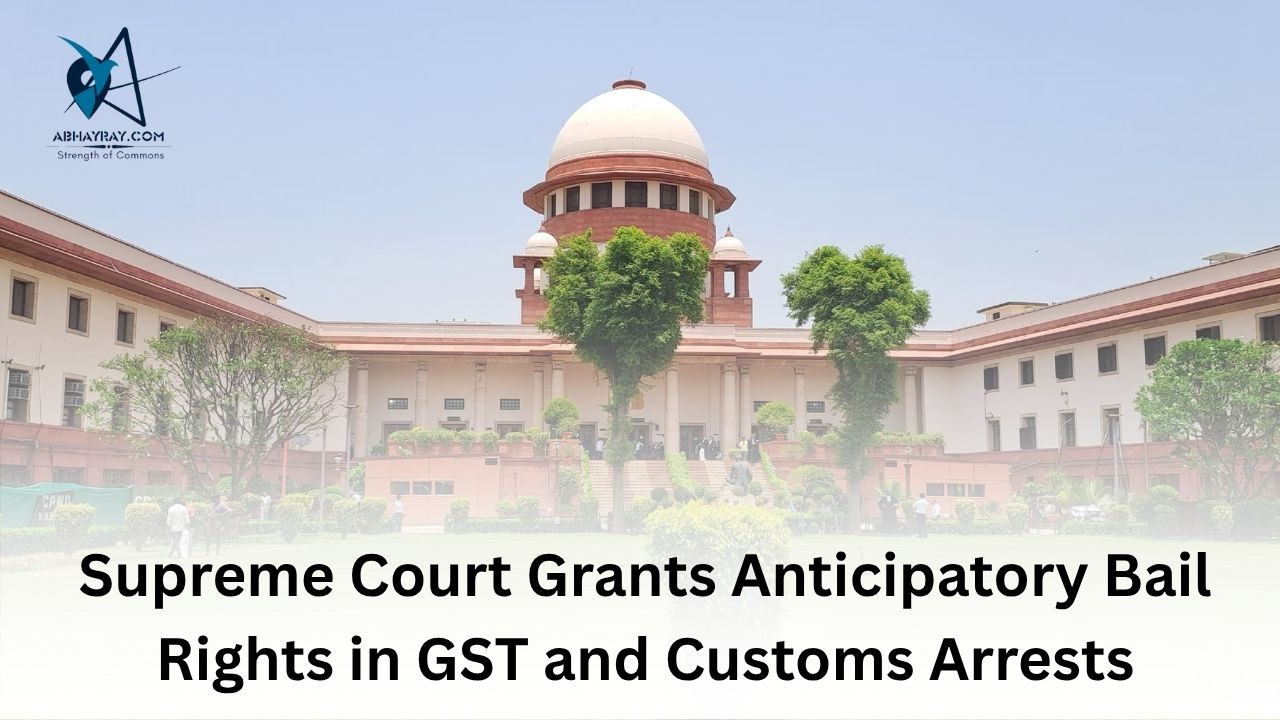Introduction
The Supreme Court has given a big relief to the traders on the arrests made under the GST Act. According to the court, in the arrests made under the Customs and GST Act, the individuals will get all the protection available under the CRPC. The court also made it clear that the Customs officer cannot be considered a police officer.
Relief announced on arrests under GST Act
Supreme Court gave relief to all traders. First let us tell you what is this matter? Actually, arrests under GST Act and Customs Act were challenged. About 279 petitions were filed in the court. On this matter, the Supreme Court has said that all the protection available under CRPC will be available. Anticipatory bail can be obtained to avoid arrest. Traders can petition the court for relief. Customs officer cannot be considered a police officer. The court had reserved its order on this last year. The Supreme Court admitted that the protection given to the accused under CRPC, BNSS will also be available to those facing prosecution under GST, Customs. The Supreme Court admitted that people facing prosecution under GST, Customs can seek anticipatory bail. Even in cases where FIR has not been registered. The Supreme Court was hearing 279 petitions challenging arrest, other punitive powers under GST, Customs Act.
Key Issues to Watch
- Legal Status of Officers – The Supreme Court may determine whether GST and Customs officers possess police-like powers under the Code of Criminal Procedure (CRPC). This will influence how their actions are scrutinized under constitutional and procedural law.
- Basis of Arrest – The ruling is expected to define whether arrests must be based on verifiable material or if mere suspicion is sufficient. This will impact how tax authorities initiate legal action against alleged offenders.
- Effect of Admissions – A significant concern is whether statements made before GST and Customs officers can be used as confessions, especially if obtained without proper safeguards.
- Procedural Safeguards – The Court may lay down specific guidelines for procedural fairness, including rights of the accused, pre-arrest conditions, and compliance with constitutional protections.
- Scope of Challenge – The judgment could determine the extent to which an arrest can be challenged before courts, ensuring that individuals have a robust mechanism to seek redressal against arbitrary actions.
What is Anticipatory bail applicable to GST and Customs Acts
The Court further held that the provisions relating to anticipatory bail are applicable to the GST (Goods and Services Tax) Act and the Customs Act, and the parties can approach the Court for relief if there is an apprehension of arrest, without the FIR being registered.The Court also observed that there was some merit in the allegations of coercion and harassment by the tax officials.
“We have commented on the basis of data with regard to allegations that there was force and coercion in the payment of taxes. We have some said that there may be some merit in it. Wherever a person is disposed to pay, he can go to the writ court and get an order. And the officers will have to be dealt with departmentally also. We have said that this cannot be permitted. This is contrary to the law. We have referred to Nandini Satpathy case in that regard,” Chief Justice of India Sanjiv Khanna stated while pronouncing the verdict.
A bench of Chief Justice of India Sanjiv Khanna and Justices MM Sundresh, Bela M Trivedi made the observation while delivering verdict in a batch of 279 petitions challenging the penal provisions in the Customs Act, CGST/SGST Act, etc. as non-compatible with the CrPC and the Constitution. The orders in the case were reserved on May 16, 2024.
There are two judgments-one by CJI Sanjiv Khanna and a concnurring judgment by Justice Trivedi. Justice Trivedi’s judgment deals with the powers of judicial review. It also expressed concerns about the ambiguity in Section 69 of the GST Act (dealing with power with arrest) and conveyed that it would interpret the law to “strengthen” liberty, if need be, but not allow citizens to be harassed. During one hearing, CJI Khanna also observed that the legislation(s) in question conferred restricted powers of arrest: “sometimes we tend to believe that investigation cannot be completed until arrest. That is not the object of the legislation. It restricts the power of arrest”. It was further highlighted that an officer’s “power to arrest” is different from “necessity of arrest”
Key Provisions in the Court’s Ruling: Applicability of CRPC to Tax Law Arrests
In its ruling, the Supreme Court emphasized that the provisions of the Criminal Procedure Code (CRPC) must be followed when arrests are made under the Goods and Services Tax (GST) and Customs Acts. This includes several key rights and procedures that must be adhered to during the arrest process:
- Right to Be Informed of the Reason for Arrest – The Court highlighted that individuals arrested under GST and Customs laws must be informed promptly of the reasons for their arrest. This aligns with the CrPC’s mandate that an arrested person must know the charges they face.
- Right to Legal Representation – The Court stressed that individuals have the right to consult with a legal practitioner after their arrest. This provision ensures that arrested individuals can seek legal advice and protection against any potential abuse of power.
- Adherence to Established Legal Standards – The ruling reinforces the necessity for tax officers to follow legal procedures and safeguards when making an arrest. This is aimed at ensuring that arrests are not arbitrary and are made based on clear and justifiable grounds, in line with the constitutional rights of the individual.
- Protections Against Arbitrary Arrests – The Court’s decision serves as a critical safeguard to prevent any misuse of arrest powers by enforcement authorities under tax laws. By applying CrPC provisions, it ensures that arrests under GST and Customs laws are not made capriciously, offering individuals protection from unlawful detention.
Conclusion
The Supreme Court’s ruling on the misuse of arrest powers by GST and Customs officers marks a significant step toward ensuring fairness and accountability in tax law enforcement. By applying the provisions of the Criminal Procedure Code (CRPC) to arrests under GST and Customs laws, the Court has established critical safeguards to protect individuals’ rights. The introduction of anticipatory bail and the requirement for judicial oversight in arrest decisions ensures that enforcement actions are carried out in a lawful, transparent, and accountable manner. This decision is a much-needed check on the powers of tax authorities, preventing arbitrary arrests while promoting a fair and just legal process. As a result, individuals and businesses now have stronger protections against potential misuse of power, creating a more balanced approach to tax enforcement.
GMICapitals.com RaysVeda.com GetMyStartup.com LawCanal.com GetMyIndia.com ZinCob.com Angeltors.com

